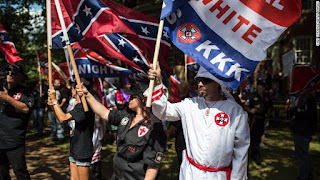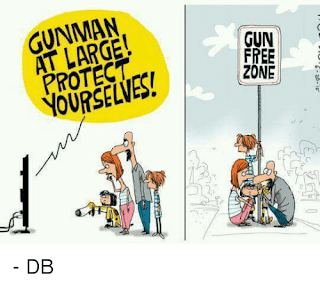All these racists suddenly emerging out of nowhere reminds me of the George R.R. Martin quote:
“When you tear out a man's tongue, you are not proving him a liar, you're only telling the world that you fear what he might say.”
At some point between the 1970s and now, the left moved from being a bunch of pacifist flower children spreading a message of colorblind love, to being a bunch of authoritarian post-modernists closely policing what people say and who's allowed to say it, and ostensibly eschewing labels while at the same time continually issuing brand new ones.
I can see how that happened, if not precisely when. The roots, I believe, lie in pacifism, and specifically in non-violent resistance. If your strategy for gaining power rests entirely on casting your enemy as a bully so the rest of the world will feel sorry for you, it leads to embracing hypoagency as being a moral good. This ethic gives rise to victim culture, or as I used to call it, "dueling dysfunctionals." Whomever can prove that s/he had the most tortured, most persecuted existence wins, and the winner gets to define reality, unchallenged, for everyone else. If Jenny wins the prize for being the most victimized, and she says that the biggest problem facing the world today is alien space lizards bent on world domination and disguising themselves as spiders, then we are all commanded by the gods of academe to believe, repeat, and act on that very idea...which is bound to really, really suck for the spiders. If anyone dissents, they're accused of hating Jenny and being in league with the spiders.
But what did that shift from lovers to despots accomplish? Did it make the world more loving and inclusive? Apparently, it just cowed the racists into silence without actually winning their hearts or changing their minds. Do you know why that is? It's because screaming accusations at somebody doesn't tend to be an effective method of persuasion.
To persuade someone, you first have to get them to stop actively resisting having their mind changed. You need to make them feel comfortable enough to let their guard down so, rather than clinging to their position like a drowning person clinging to a bit of flotsam, they're comfortable stepping back with you to look at their position and yours with a more objective eye. To accomplish this, you first have to stop attacking them and make it clear that you're not waiting for just the right moment to pounce and start attacking them again. Then, you have to acknowledge their lived reality. They might be dead wrong about the state of affairs, but even if they perceive things differently than they actually are, that doesn't completely negate the value of their perception. They simply have an incomplete or skewed picture. It's not wrong so much as only right within a very narrow frame of viewing. Stand with them in that place, looking out at the world from their little arrow loop of a window, and show them how to push the boundaries to allow for a wider, more complete view.
This, I feel, is why the left has failed to convert more people away from racism--it never dared to listen to the racists' concerns. It never bothered to acknowledge the racists' anxieties. It just pointed fingers and screamed, "Racist! Nazi! Sub-human filth!" browbeating them into silence. So when the racists, for example, look at the national crime statistics and see that blacks commit about half the murders in America despite being only about 13% of the population, and they fallaciously infer that black people are therefore more inherently violent, the left doesn't acknowledge the statistic and explain why things are that way. They just scream, "You can't say that! That's racist!" The racist shuts up if enough people ostracize him intensely enough, but he remembers that he read the facts and that the leftist failed to refute them or offer any explanation that would negate the racist's (incorrect) conclusion. In his mind, his perception is the truth, backed up by hard, scientific numbers, and the leftist simply says that you're not allowed to speak the truth because it might hurt someone's feelings, and victims' feelings trump facts. Instead of slowly coming around to at least partially accepting the leftist's point of view, he instead decides that leftists are unreasonable and duplicitous, and he withdraws from contact with them, instead seeking the company of others who will echo and validate his racist views.
A friend of mine recently said that Americans need to start taking responsibility for their opinions. That's clearly true among the racists who have been committing random acts of violence against minorities (or encouraging others to do so), but I think it's also true of leftists who can't wrap their minds around the idea of someone daring to do something so heretical as having a different opinion than theirs.
To persuade someone, you first have to get them to stop actively resisting having their mind changed. You need to make them feel comfortable enough to let their guard down so, rather than clinging to their position like a drowning person clinging to a bit of flotsam, they're comfortable stepping back with you to look at their position and yours with a more objective eye. To accomplish this, you first have to stop attacking them and make it clear that you're not waiting for just the right moment to pounce and start attacking them again. Then, you have to acknowledge their lived reality. They might be dead wrong about the state of affairs, but even if they perceive things differently than they actually are, that doesn't completely negate the value of their perception. They simply have an incomplete or skewed picture. It's not wrong so much as only right within a very narrow frame of viewing. Stand with them in that place, looking out at the world from their little arrow loop of a window, and show them how to push the boundaries to allow for a wider, more complete view.
This, I feel, is why the left has failed to convert more people away from racism--it never dared to listen to the racists' concerns. It never bothered to acknowledge the racists' anxieties. It just pointed fingers and screamed, "Racist! Nazi! Sub-human filth!" browbeating them into silence. So when the racists, for example, look at the national crime statistics and see that blacks commit about half the murders in America despite being only about 13% of the population, and they fallaciously infer that black people are therefore more inherently violent, the left doesn't acknowledge the statistic and explain why things are that way. They just scream, "You can't say that! That's racist!" The racist shuts up if enough people ostracize him intensely enough, but he remembers that he read the facts and that the leftist failed to refute them or offer any explanation that would negate the racist's (incorrect) conclusion. In his mind, his perception is the truth, backed up by hard, scientific numbers, and the leftist simply says that you're not allowed to speak the truth because it might hurt someone's feelings, and victims' feelings trump facts. Instead of slowly coming around to at least partially accepting the leftist's point of view, he instead decides that leftists are unreasonable and duplicitous, and he withdraws from contact with them, instead seeking the company of others who will echo and validate his racist views.
A friend of mine recently said that Americans need to start taking responsibility for their opinions. That's clearly true among the racists who have been committing random acts of violence against minorities (or encouraging others to do so), but I think it's also true of leftists who can't wrap their minds around the idea of someone daring to do something so heretical as having a different opinion than theirs.



















